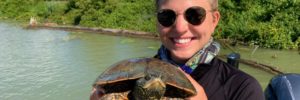Recreational angling has been shown to reduce baby bass survival by interefering with the paternal care provided by adult male bass guarding the nests. However, during 2019-2020, a study found a 3-fold increase in the abundance of baby bass in a lake in Southern Ontario. This research suggests that both the halt on fishing due to pandemic lockdowns and the US-Canada border closures could rejuvenate the population for years. Replicating these conditions by blocking off nesting areas in lakes and rivers from recreational fishing could have positive outcomes for bass populations. More information here.
Latest News
-
Cooke lab members attend the American Fisheries Society annual meeting in Honolulu!
November 22, 2024 4:37 pm
By: fecpl
Several past and present Cooke lab members presented and enjoyed...
-
Our lab celebrates our most recent grad students for defending their MSc and PhD theses (Sept 2023).
September 17, 2023 4:25 am
By: fecpl
-
Lab members assembled at the inaugural SCAS meeting in Montreal in February of 2023.
February 27, 2023 11:01 pm
By: fecpl
There were many team members (past and present) at the...
-
PhD student Jessica Robichaud discusses her turtle research with CBC Radio
November 11, 2022 10:09 pm
By: fecpl
https://www.cbc.ca/listen/live-radio/1-193-fresh-air/clip/15946967-what-turtles-ontario-winters
-
November 2, 2022 4:57 pm
By: fecpl
The Canadian Centre for Evidence-Based Conservation and the FECPL at...





